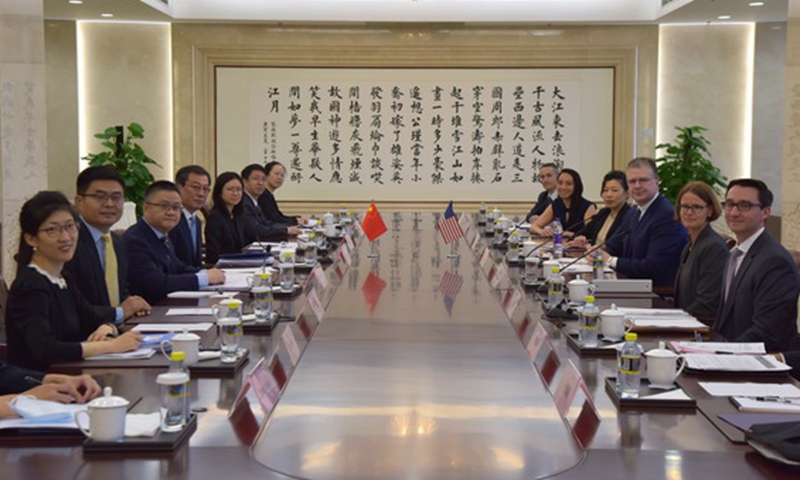US 'self-contradictory acts' unhelpful to resume high-level communication

Yang Tao, director-general of the Department of North American and Oceanian Affairs, held talks with the visiting US Assistant Secretary of State for East Asian and Pacific Affairs Daniel Kritenbrink and US National Security Council official Sarah Beran in Beijing on June5, 2023. Photo: Chinese Foreign Ministry
Even as it dispatched senior US State Department and National Security Council officials to China to engage in communication, the White House retains its hostile tone by accusing the Chinese military of "growing aggressiveness" when dealing with US warships and aircraft making provocative maneuvers in the waters and airspace near Chinese territory.
Chinese analysts said there is no sign that Washington would correct its mistakes and show sincerity, or be less provocative toward China in order to seek a resumption of higher-level official exchanges, despite the US side continuing to claim they are seeking communication with China. This kind of self-contradictory act will not bring what the US wants, experts noted.
The war of words prompted by the US' provocations in the South China Sea and the Taiwan Straits continues, even though the Shangri-La Dialogue has ended. White House spokesperson John Kirby on Monday said at a press briefing that actions by the Chinese militaryin the Taiwan Straits and South China Sea reflect a "growing aggressiveness "that raises "the risk of an error where someone gets hurt." Kirby said the US would continue to stand up for "the freedom of navigation" in the air and sea.
In response to Kirby's remarks, Wang Wenbin, a spokesperson of the Chinese Foreign Ministry, said at a routine press conference on Tuesday that "the truth is that the US military warships and planes traveled thousands of miles to China's doorstep to provoke and insist on doing close reconnaissance near China's territorial waters and airspace, showing off their power."
"This is not to safeguard freedom of navigation, but to promote hegemony of navigation, which is naked military provocation, and this kind of hegemonic behavior is the root cause of sea and air security risks," Wang told reporters.
China has always respected the rights of navigation and overflight enjoyed by all countries in accordance with international law, but firmly opposes using "the freedom of navigation and overflight" as a pretext to endanger China's sovereignty and security, Wang noted. "The Chinese military carried out legitimate on-site response in relevant waters and airspace, and the relevant measures were professional, legal and reasonable," he said.
On Monday, Chinese Vice Foreign Minister Ma Zhaoxu met with visiting US Assistant Secretary of State for East Asian and Pacific Affairs Daniel Kritenbrink and US National Security Council official Sarah Beran in Beijing.
According to the website of the Chinese Foreign Ministry, Yang Tao, director-general of the Department of North American and Oceanian Affairs, held talks with the visiting US officials. Surrounding the consensus reached by the presidents of the two countries in Bali in November 2022, the two sides conducted "candid, constructive and productive communication" on improving bilateral ties and properly handling and managing differences and problems. China stated its solemn position on matters of principle including the Taiwan question. The two sides agree to maintain communications.
The US' statement that described the meeting as "productive" clearly shows that the US side has expectations for stabilizing China-US relations. But it also used words such as "compete vigorously" to leave room for provocation and conflict. As far as the whole sentence is concerned, the US deliberately played with the rhetoric of strategic ambiguity, only calling it "compete vigorously," but did not explicitly say with whom and for what, Lü pointed out.
Such strategic ambiguity reflects that the US is no longer fully confident that it can gain an advantage in what they call strategic competition, and it is also uneasy about the prospects and consequences of conflicts with China, Lü explained.
Regarding the duplicity of the US, China should adhere to strategic clarity, maintain its steadiness, correctly guide the various emotions of the US and strive to gradually ease bilateral tensions in the near future, so that they can make joint contributions to world peace and prosperity, Lü noted.
Li Haidong, a professor at the China Foreign Affairs University, told the Global Times on Tuesday that the US officials' visit is not driven by sincerity and the goodwill to fix bilateral ties, but to make bilateral relations develop in the way that fits the interests of US hegemony. Also the Americans hope to seek more realities about us through communication and dialogue, as the channels for obtaining information and intelligence about China are becoming increasingly less for the US, said the expert.
Not only US diplomats, but the US military has also expressed the desire to seek talks with China. After US Defense Secretary Lloyd Austin failed to meet Chinese State Councilor and Defense Minister Li Shangfu in Singapore because the US side refused to correct its mistakes that have added to the difficulties for China-US military communication, US Chairman of the Joint Chiefs of Staff Mark Milley told CNN that he also has not been able to speak with China's most senior general.
On Monday, Milley said it was critical for the two countries to be able to speak. While Milley said that the US and China have exchanged "messages back and forth," he and Austin would "like to have an opportunity to talk."
US officials now find that they know too little about what is happening in China in terms of economy, development and politics, since the US has unilaterally cut off or damaged many governmental and non-governmental communication channels since the Trump administration launched the trade war in 2018, and the Biden administration failed to fix the ties in recent years, experts said.
Lü Xiang, an expert on US studies and research fellow at the Chinese Academy of Social Sciences, told the Global Times on Tuesday that "this is why US officials, diplomats and military officers keep asking for talks but show no sincerity and goodwill at the moment."
"China is always open for communication, and there is nothing we are hiding from the US about our intentions. The US wants to keep strategic ambiguity on its China policy, but China shows its strategic clarity of not seeking hegemony, and that's why we agree to maintain communication channels, Lü said, adding that this is despite the US showing no clear sincerity yet.
Li said there are two major international events - the G20 Summit and the APEC meeting - to be held later this year, and if the top leaders of the two countries are going to attend these events, there will be the possibility of a bilateral meeting, so US officials are also seeking coordination with China to arrange a potential summit as well. "But again, the US side needs to think through this question: to what extent they can show its sincerity and create the conditions for a meeting when they remain hostile and provocative against China on all fronts."
Photos
Related Stories
- China, U.S. officials meet on improving bilateral relations: spokesperson
- Washington should never cross Beijing's redline
- "Leadership" does not imply hegemony, Chinese delegation says at Shangri-La Dialogue
- China, U.S. should properly handle differences, find right way to get along: defense minister
- Chinese, U.S. trade officials agree to strengthen exchanges: commerce ministry
Copyright © 2023 People's Daily Online. All Rights Reserved.









